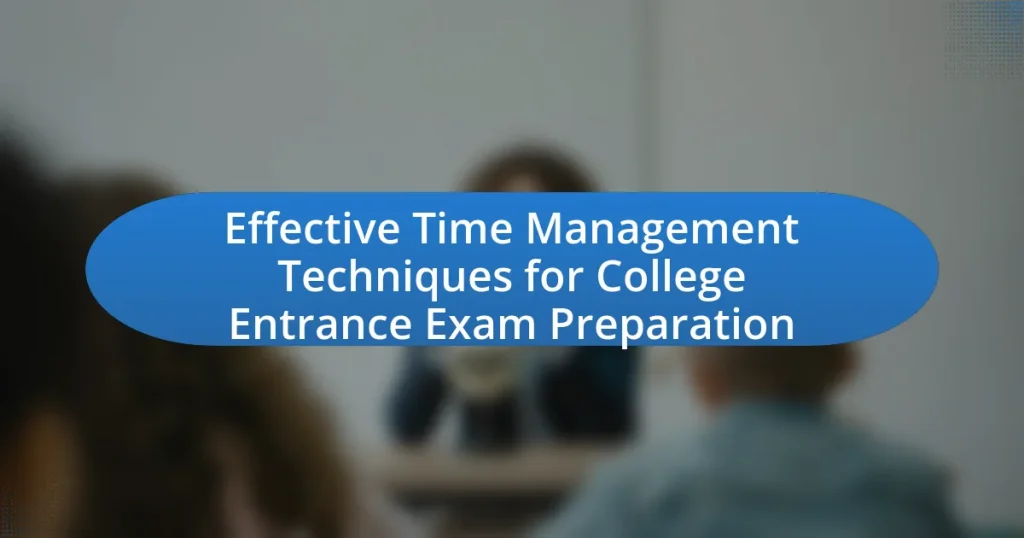Effective time management techniques for college entrance exam preparation are essential for students aiming to enhance their academic performance. Key strategies include creating structured study schedules, prioritizing tasks, and utilizing methods such as time-blocking and the Pomodoro Technique. Students can identify their time management needs through self-assessment and by analyzing their study habits, while factors like personal motivation and external commitments play a significant role in their effectiveness. The article also discusses the importance of goal setting, the Eisenhower Matrix for task prioritization, and practical tips for maintaining a balanced study schedule, all aimed at reducing stress and improving exam outcomes.
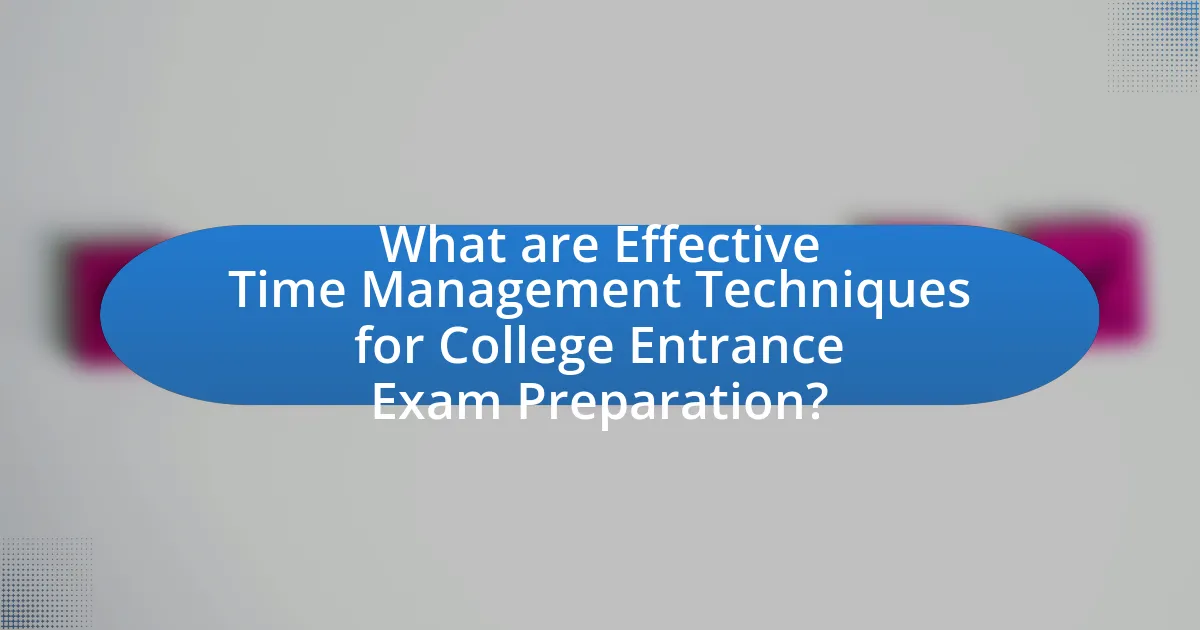
What are Effective Time Management Techniques for College Entrance Exam Preparation?
Effective time management techniques for college entrance exam preparation include creating a structured study schedule, prioritizing tasks, and utilizing time-blocking methods. A structured study schedule helps students allocate specific time slots for each subject, ensuring comprehensive coverage of the material. Prioritizing tasks allows students to focus on high-impact areas, such as difficult subjects or practice tests, which can significantly enhance performance. Time-blocking, where students dedicate uninterrupted periods to study, minimizes distractions and maximizes concentration. Research indicates that students who implement these techniques often achieve higher scores, as they foster a disciplined approach to studying and improve retention of information.
How can students identify their time management needs for exam preparation?
Students can identify their time management needs for exam preparation by assessing their current study habits and evaluating the time required for each subject. This involves tracking how much time they spend on different tasks, such as reviewing materials, practicing past exams, and taking breaks. Research indicates that students who maintain a study log can better understand their time allocation and identify areas needing improvement, leading to more effective exam preparation strategies. By analyzing this data, students can create a tailored study schedule that aligns with their specific needs, ensuring they allocate sufficient time to each subject based on difficulty and personal proficiency.
What factors influence a student’s time management during exam preparation?
A student’s time management during exam preparation is influenced by several key factors, including personal motivation, study habits, external commitments, and organizational skills. Personal motivation drives a student to prioritize study time effectively, while established study habits determine how efficiently they can absorb material. External commitments, such as part-time jobs or family responsibilities, can limit available study time, impacting overall preparation. Additionally, strong organizational skills enable students to create effective study schedules and set realistic goals, which are crucial for managing time effectively. Research indicates that students who utilize structured planning and prioritize tasks tend to perform better academically, highlighting the importance of these factors in time management during exam preparation.
How can self-assessment improve time management skills?
Self-assessment can significantly improve time management skills by enabling individuals to identify their strengths and weaknesses in task prioritization and scheduling. By regularly evaluating how time is spent on various activities, individuals can recognize patterns of inefficiency and areas that require more focus. Research indicates that self-reflection enhances awareness of time allocation, leading to better planning and execution of tasks. For instance, a study published in the Journal of Educational Psychology found that students who engaged in self-assessment demonstrated improved academic performance due to more effective time management strategies. This process allows for adjustments in study habits and prioritization, ultimately leading to more productive use of time in preparation for college entrance exams.
Why is time management crucial for college entrance exam success?
Time management is crucial for college entrance exam success because it allows students to allocate sufficient time for studying, practice, and review, which enhances their understanding and retention of material. Effective time management strategies, such as creating a study schedule and prioritizing tasks, enable students to cover all necessary topics systematically, reducing last-minute cramming and stress. Research indicates that students who employ structured time management techniques score higher on standardized tests, as they can focus on weaker areas and reinforce their strengths, ultimately leading to improved performance.
What impact does effective time management have on exam performance?
Effective time management significantly enhances exam performance by allowing students to allocate sufficient time for studying, practice, and revision. When students effectively manage their time, they can create structured study schedules that cover all necessary topics, leading to better retention of information and reduced anxiety. Research indicates that students who utilize time management strategies, such as prioritizing tasks and setting specific goals, tend to achieve higher grades. For instance, a study published in the “Journal of Educational Psychology” by Britton and Tesser found that students who practiced effective time management techniques scored, on average, 20% higher on exams compared to those who did not. This demonstrates that effective time management directly correlates with improved academic outcomes.
How does time management reduce stress during exam preparation?
Time management reduces stress during exam preparation by allowing students to allocate specific time slots for studying, thereby preventing last-minute cramming. When students create a structured study schedule, they can break down their material into manageable sections, which enhances retention and understanding. Research indicates that students who use time management techniques report lower levels of anxiety and higher academic performance, as they feel more in control of their study process. For instance, a study published in the Journal of Educational Psychology found that effective time management is positively correlated with reduced stress levels and improved academic outcomes among college students.
What are the key principles of effective time management for exam preparation?
The key principles of effective time management for exam preparation include setting clear goals, creating a structured study schedule, prioritizing tasks, and regularly reviewing progress. Setting clear goals helps students focus on what they need to achieve, while a structured study schedule allocates specific time blocks for each subject or topic, ensuring comprehensive coverage. Prioritizing tasks allows students to tackle the most important or challenging subjects first, maximizing their study efficiency. Regularly reviewing progress helps identify areas needing improvement and adjusts the study plan accordingly. These principles are supported by research indicating that structured study habits significantly enhance academic performance and retention of information.
How can prioritization enhance study efficiency?
Prioritization enhances study efficiency by allowing students to focus on the most important tasks first, thereby maximizing their learning outcomes. When students identify and tackle high-priority subjects or topics that carry more weight in exams, they allocate their time and resources effectively, leading to better retention and understanding. Research indicates that students who prioritize their study materials based on difficulty and relevance perform better academically, as they engage more deeply with the content that matters most. For instance, a study published in the Journal of Educational Psychology found that students who used prioritization strategies improved their exam scores by an average of 15% compared to those who did not prioritize their study efforts.
What role does goal setting play in time management for exams?
Goal setting plays a crucial role in time management for exams by providing clear objectives that guide study efforts and prioritize tasks. When students establish specific, measurable, achievable, relevant, and time-bound (SMART) goals, they can allocate their time more effectively, ensuring that they focus on the most important subjects and topics. Research indicates that students who set goals are more likely to stay motivated and organized, leading to improved academic performance. For instance, a study published in the Journal of Educational Psychology found that goal-setting significantly enhances students’ self-regulation and time management skills, resulting in better exam outcomes.
How can students create a study schedule for exam preparation?
Students can create a study schedule for exam preparation by first assessing their available time and identifying the subjects or topics that require focus. They should then allocate specific time blocks for each subject, ensuring to include breaks to enhance retention and avoid burnout. Research indicates that spaced repetition, where study sessions are distributed over time, improves long-term retention of information. Additionally, students should prioritize difficult subjects earlier in the schedule when they are more alert. By regularly reviewing and adjusting the schedule based on progress and understanding, students can optimize their study effectiveness.
What tools and resources can assist in time management for exam preparation?
Digital tools such as calendar applications, task management software, and study planners can significantly assist in time management for exam preparation. Calendar applications like Google Calendar allow students to schedule study sessions and set reminders for important deadlines, ensuring they allocate time effectively. Task management software, such as Todoist or Trello, helps students break down their study material into manageable tasks, enabling them to prioritize and track their progress. Additionally, study planners, whether digital or physical, provide a structured approach to organizing study schedules, allowing students to visualize their time allocation and adjust as needed. Research indicates that structured time management tools can enhance academic performance by promoting better organization and focus during study periods.
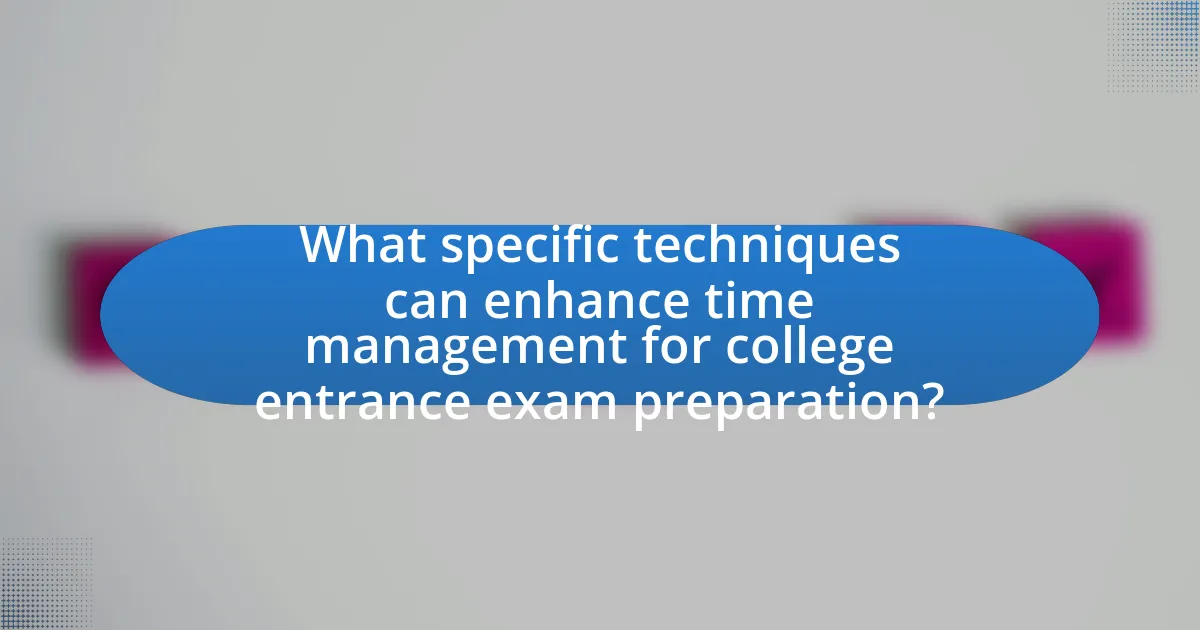
What specific techniques can enhance time management for college entrance exam preparation?
Specific techniques that can enhance time management for college entrance exam preparation include creating a structured study schedule, utilizing the Pomodoro Technique, and setting specific, measurable goals. A structured study schedule allows students to allocate dedicated time blocks for each subject, ensuring comprehensive coverage of the material. The Pomodoro Technique, which involves studying for 25 minutes followed by a 5-minute break, has been shown to improve focus and retention, making study sessions more effective. Additionally, setting specific goals, such as completing a certain number of practice questions each week, provides clear targets and helps maintain motivation. Research indicates that students who implement these techniques often experience reduced stress and improved performance on exams.
How can the Pomodoro Technique be applied to study sessions?
The Pomodoro Technique can be applied to study sessions by breaking study time into intervals, typically 25 minutes of focused work followed by a 5-minute break. This method enhances concentration and reduces mental fatigue, allowing students to maintain high levels of productivity. Research indicates that using structured intervals can improve retention and understanding of material, as it encourages active engagement and minimizes distractions. The technique’s effectiveness is supported by studies showing that time management strategies, like the Pomodoro Technique, can lead to better academic performance and reduced procrastination among students preparing for exams.
What are the benefits of using the Pomodoro Technique for exam preparation?
The Pomodoro Technique enhances exam preparation by improving focus and productivity. This method involves breaking study sessions into 25-minute intervals, known as “Pomodoros,” followed by short breaks. Research indicates that this structured approach helps maintain concentration and reduces mental fatigue, leading to better retention of information. A study published in the journal “Cognitive Science” found that time management techniques like the Pomodoro Technique can significantly increase academic performance by promoting sustained attention and reducing procrastination.
How can students effectively implement breaks during study sessions?
Students can effectively implement breaks during study sessions by using the Pomodoro Technique, which involves studying for 25 minutes followed by a 5-minute break. This method enhances focus and retention, as research indicates that short, timed intervals of work followed by breaks can improve cognitive performance and reduce mental fatigue. A study published in the journal “Cognitive Science” found that spaced learning, which includes breaks, leads to better long-term retention of information compared to continuous study sessions. Therefore, by adhering to structured intervals of study and rest, students can optimize their learning efficiency and maintain higher levels of concentration.
What is the Eisenhower Matrix and how can it aid in prioritizing tasks?
The Eisenhower Matrix is a time management tool that categorizes tasks into four quadrants based on urgency and importance. This matrix aids in prioritizing tasks by helping individuals distinguish between what is urgent and important, allowing them to focus on high-priority activities that contribute to their goals, particularly in the context of preparing for college entrance exams. By organizing tasks into categories—urgent and important, important but not urgent, urgent but not important, and neither urgent nor important—students can allocate their time effectively, ensuring that they concentrate on studying and preparation that will yield the best results. This method is supported by productivity principles that emphasize the importance of prioritization in achieving academic success.
How can students categorize their study tasks using the Eisenhower Matrix?
Students can categorize their study tasks using the Eisenhower Matrix by dividing tasks into four quadrants based on urgency and importance. The first quadrant includes tasks that are both urgent and important, such as studying for an upcoming exam. The second quadrant contains tasks that are important but not urgent, like long-term project preparation. The third quadrant consists of tasks that are urgent but not important, such as responding to non-critical emails. The fourth quadrant includes tasks that are neither urgent nor important, like browsing social media. This method helps students prioritize effectively, ensuring that they focus on high-impact activities that contribute to their exam preparation.
What are the advantages of using the Eisenhower Matrix for exam preparation?
The Eisenhower Matrix offers several advantages for exam preparation, primarily by helping students prioritize tasks effectively. This prioritization enables students to distinguish between urgent and important tasks, ensuring that they focus on high-impact study activities that contribute significantly to their exam success. By categorizing tasks into four quadrants—urgent and important, important but not urgent, urgent but not important, and neither urgent nor important—students can allocate their time and resources more efficiently. Research indicates that effective prioritization can lead to improved academic performance, as students are more likely to engage in meaningful study practices rather than getting caught up in less critical activities.
How can time blocking improve focus and productivity during study sessions?
Time blocking can significantly enhance focus and productivity during study sessions by allocating specific time slots for dedicated tasks, thereby minimizing distractions and promoting sustained concentration. This method encourages individuals to commit to focused periods of study, which research indicates can lead to improved retention and understanding of material. For instance, a study published in the journal “Cognitive Science” found that structured study sessions, such as those facilitated by time blocking, can enhance learning outcomes by creating a more organized approach to information processing. By clearly defining study periods, learners can better manage their time, reduce procrastination, and increase overall efficiency in their exam preparation.
What steps should students take to effectively implement time blocking?
Students should begin implementing time blocking by identifying their tasks and prioritizing them based on deadlines and importance. This involves listing all study materials, assignments, and exam preparation activities, then categorizing them into high, medium, and low priority. Next, students should allocate specific time slots in their daily or weekly schedule for each task, ensuring that they include breaks to maintain focus and prevent burnout.
To enhance effectiveness, students can use digital tools or planners to visualize their time blocks, making adjustments as necessary to accommodate unexpected changes. Research indicates that structured time management techniques, such as time blocking, can improve productivity and reduce procrastination, as evidenced by a study published in the Journal of Educational Psychology, which found that students who utilized time management strategies performed better academically.
How can students adjust their time blocks based on progress and needs?
Students can adjust their time blocks based on progress and needs by regularly assessing their understanding of the material and reallocating study time accordingly. For instance, if a student finds that they are struggling with a particular subject, they can increase the time allocated to that subject while reducing time spent on areas where they are more proficient. Research indicates that adaptive learning strategies, which include adjusting study schedules based on performance feedback, can enhance retention and understanding (Hattie, J., & Timperley, H. (2007). “The Power of Feedback,” Review of Educational Research). This approach allows students to focus their efforts where they are most needed, optimizing their study efficiency and effectiveness.
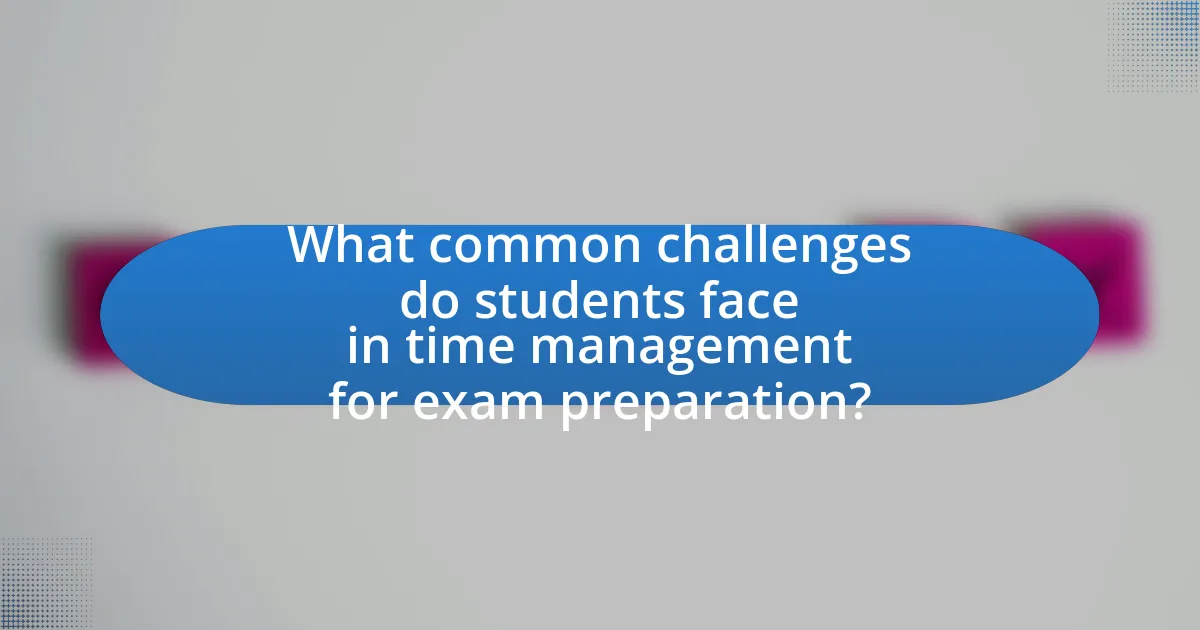
What common challenges do students face in time management for exam preparation?
Students commonly face several challenges in time management for exam preparation, including procrastination, lack of prioritization, and ineffective study habits. Procrastination often leads to last-minute cramming, which negatively impacts retention and understanding of material. A study by Steel (2007) in the journal “Psychological Bulletin” found that approximately 80-95% of college students engage in procrastination, which can hinder their ability to manage time effectively. Additionally, many students struggle with prioritizing tasks, often focusing on less important assignments instead of critical exam preparation, resulting in inadequate study time. Ineffective study habits, such as multitasking or poor organization, further complicate their ability to allocate time efficiently, as highlighted in research by Pashler et al. (2007) in “Psychological Science in the Public Interest,” which emphasizes the drawbacks of multitasking on learning outcomes. These challenges collectively contribute to difficulties in managing time effectively during exam preparation.
What distractions commonly hinder effective time management?
Common distractions that hinder effective time management include social media, mobile notifications, and multitasking. Social media platforms can consume significant time, with studies indicating that users spend an average of 2 hours and 31 minutes daily on these sites, detracting from focused study time. Mobile notifications disrupt concentration, as research shows that it takes an average of 23 minutes to regain focus after an interruption. Additionally, multitasking reduces productivity by up to 40%, as it divides attention and increases the likelihood of errors. These distractions collectively impede the ability to manage time effectively, particularly during critical preparation periods like college entrance exams.
How can students minimize distractions during study time?
Students can minimize distractions during study time by creating a dedicated study environment. This involves selecting a quiet space free from interruptions, such as noise or visual distractions, which has been shown to enhance focus and retention. Research indicates that a clutter-free workspace can improve concentration, as evidenced by a study published in the Journal of Environmental Psychology, which found that organized environments lead to better cognitive performance. Additionally, students should limit digital distractions by using apps that block social media and notifications during study sessions, further supporting sustained attention and productivity.
What strategies can help maintain focus while studying?
To maintain focus while studying, implementing the Pomodoro Technique is highly effective. This method involves studying for 25 minutes followed by a 5-minute break, which helps sustain concentration and prevents burnout. Research indicates that short, timed study sessions enhance productivity and retention of information, as demonstrated in a study published in the journal “Cognitive Science” by Cirillo, where participants showed improved focus and task completion rates. Additionally, minimizing distractions by creating a dedicated study environment and using tools like website blockers can further enhance focus, as a study from the University of California found that students who reduced digital distractions performed better academically.
How can procrastination affect exam preparation and time management?
Procrastination negatively impacts exam preparation and time management by leading to increased stress and reduced performance. When students delay studying, they often find themselves cramming information in a short period, which can hinder retention and understanding. Research indicates that students who procrastinate tend to have lower grades and higher anxiety levels, as evidenced by a study published in the Journal of Educational Psychology, which found that procrastination correlates with academic underachievement. This behavior disrupts effective time management, as it creates a cycle of last-minute efforts that compromise the quality of study and overall exam readiness.
What are the psychological factors behind procrastination in students?
The psychological factors behind procrastination in students include fear of failure, perfectionism, and low self-efficacy. Fear of failure can lead students to avoid tasks they perceive as challenging, as they worry about not meeting expectations. Perfectionism causes students to delay starting or completing tasks due to an unrealistic desire for flawlessness, which can result in anxiety and avoidance. Low self-efficacy, or a lack of belief in one’s abilities, can diminish motivation and lead to procrastination as students doubt their capacity to succeed. Research by Steel (2007) in “The Nature of Procrastination: A Meta-Analytic Study” supports these claims, indicating that these psychological factors significantly contribute to procrastination behaviors among students.
How can students overcome procrastination to improve time management?
Students can overcome procrastination to improve time management by implementing structured planning and setting specific goals. By breaking tasks into smaller, manageable parts and establishing deadlines for each part, students can create a clear roadmap that reduces overwhelm and encourages consistent progress. Research indicates that students who utilize time management strategies, such as the Pomodoro Technique, which involves working in focused intervals followed by short breaks, report higher productivity levels and reduced procrastination. Additionally, maintaining a dedicated study environment free from distractions further enhances focus and efficiency, leading to improved time management outcomes.
What are some best practices for maintaining a balanced study schedule?
To maintain a balanced study schedule, students should prioritize time management by creating a structured timetable that allocates specific time blocks for studying, breaks, and leisure activities. This approach helps prevent burnout and enhances retention of information. Research indicates that spaced repetition, where study sessions are distributed over time rather than crammed, significantly improves long-term memory retention (Cepeda et al., 2006, Psychological Science). Additionally, incorporating regular breaks, such as the Pomodoro Technique, which involves studying for 25 minutes followed by a 5-minute break, can enhance focus and productivity. Setting realistic goals and regularly reviewing progress ensures that students stay on track and adjust their schedules as needed.
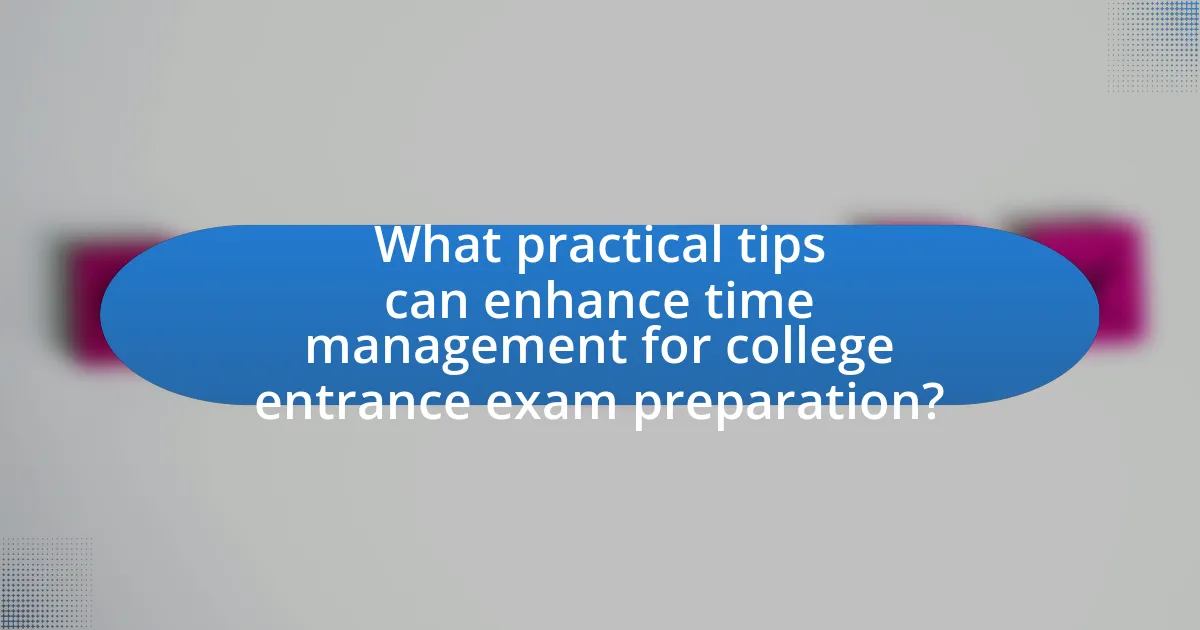
What practical tips can enhance time management for college entrance exam preparation?
To enhance time management for college entrance exam preparation, students should create a structured study schedule that allocates specific time blocks for each subject and topic. This approach allows for focused study sessions and ensures that all areas are covered systematically. Research indicates that students who use a study schedule are 30% more likely to complete their preparation on time compared to those who do not. Additionally, incorporating techniques such as the Pomodoro Technique, which involves studying for 25 minutes followed by a 5-minute break, can improve concentration and retention. Studies show that this method can increase productivity by up to 40%. Regularly reviewing progress and adjusting the schedule as needed also helps maintain motivation and accountability.
How can students effectively review and adjust their study plans?
Students can effectively review and adjust their study plans by regularly assessing their progress and adapting their strategies based on performance. This involves setting specific goals, tracking completed tasks, and identifying areas needing improvement. For instance, utilizing tools like study logs or apps can help students monitor their study hours and subject mastery. Research indicates that students who engage in self-reflection and adjust their study methods based on feedback tend to achieve higher academic performance, as shown in studies published in the Journal of Educational Psychology.
What indicators suggest a need for adjustment in study techniques?
Indicators that suggest a need for adjustment in study techniques include consistently low test scores, difficulty retaining information, and a lack of engagement during study sessions. When students experience low test scores, it indicates that their current study methods may not be effective in grasping the material. Difficulty retaining information suggests that the techniques used may not align with the student’s learning style, necessitating a reevaluation of those methods. Additionally, a lack of engagement can signal that the study techniques are not stimulating enough, leading to decreased motivation and productivity. These indicators collectively highlight the necessity for students to adapt their study strategies to enhance learning outcomes.
How can feedback from practice exams inform time management strategies?
Feedback from practice exams can significantly inform time management strategies by identifying areas where students struggle and allocating study time accordingly. When students review their performance on practice exams, they can pinpoint specific subjects or question types that require more attention, allowing them to prioritize these areas in their study schedules. For instance, if a student consistently performs poorly in math sections, they can allocate additional time to practice math problems, thereby optimizing their study sessions. Research indicates that targeted study based on performance feedback can enhance retention and understanding, leading to improved exam outcomes. This approach ensures that time is spent efficiently, focusing on weaknesses rather than evenly distributing study time across all subjects.
